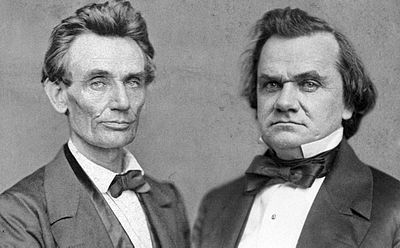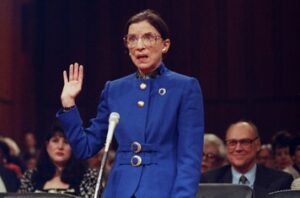The year was 1858, and the day was August 21 in the city of Ottawa, Illinois. It was dusty and hot, and there were about 12,000 people waiting in the audience around a speaking stand for a train to come in from the nearby city of Morris. The people were waiting for the arrival of Abraham Lincoln. Stephen Douglas had already arrived, and he was accompanied by a number of people as he made his way towards the speaking stand. These two men drew a very large crowd, because they were about to debate each other on issues of great national importance. The debate that was to take place this day was the first of a series of seven debates that would go down in history as “The Lincoln-Douglas Debates of 1858.” Abraham Lincoln would become President two years after these debates, in the Election of 1860. But he was not running for President in 1858. He was challenging the sitting Senator of Illinois for his Senate seat. And Stephen A. Douglas was that United States Senator.
The format for these debates was for the first speaker to give an opening speech for an hour, then the second person was to speak for ninety-minutes, and then the first speaker was to make his closing remarks for half an hour. That first debate in Ottawa was very important, as it was the first of its kind. But the Ottawa debate was something of a trial run for Lincoln, rather than an actual debate. Lincoln did not end up delivering his arguments effectively in Ottawa, which resulted in Douglas dominating the debate. And the topics that were brought up there were not discussed by Lincoln in depth. But by the time Lincoln got to the fifth debate, in Galesburg, we find Lincoln there in his finest form. Lincoln turned the tide of the debates in his favor, and he gained significant momentum for the rest of his campaign.

That fifth debate in Galesburg took place on October 7, and was held at Knox College. It was a windy and rainy day. The platform where Lincoln and Douglas were supposed to make their speeches was too high for either of them to reach through ordinary means, so they both had to climb through one of the windows in the College and then descend from a ladder to reach the speaking stand. Douglas opened his speech by making known his opposition to the Lecompton Constitution, which was the proposed Kansas state constitution of 1857, which was backed by the pro-slavery supporters in Kansas. This constitution proposed that slavery should be permitted, while free blacks should be excluded from living in Kansas.1 It is interesting to note that Douglas sided with the Republicans on this issue, instead of siding with fellow Democrats, such as President James Buchanan. Douglas brought up the topic of the Republican Party, and he asked Lincoln if the Republican Party was trying to destroy the political foundation of the United States.2 He went on to say that the Republican Party did not proclaim its principles in the North nor in the South. He accused Lincoln especially for giving different speeches to different audiences. Douglas claimed that Lincoln altered his views at different debates to appeal to various audiences.3 If Douglas was seen as correct on that matter, he might sway people who were inclined to vote for Lincoln to vote for him instead. Douglas continued his speech by stating that the Declaration of Independence was solely intended for white people in reference to the section in the Declaration where it stated that “all men are created equal.” Douglas believed that it was heretical to claim that the Declaration of Independence was intended for all people.

Lincoln’s response was that nobody before Douglas had claimed that the Declaration of Independence was only intended for white people. Lincoln thought that it was interesting that Douglas was interpreting the Declaration of Independence in the manner that he did, because he believed that black people had no rights and they should never gain any rights. The Declaration of Independence did not explicitly condemn slavery nor mention it, but Lincoln brought up a very convincing point regarding the institute of slavery and how Douglas was interpreting the document incorrectly. Lincoln said that Thomas Jefferson owned slaves but trembled at the thought of God’s justice on the matter of slavery.4
Lincoln then came back to a subject he had mentioned in a previous debate: The Dred Scott Decision of 1857. That was the legal case where the Supreme Court of the United States ruled 7-2 in the decision that Dred Scott, as a black man of slave ancestors, was not a United States citizen, and therefore had no right to sue in a federal court of law for anything, let alone his freedom. It also stipulated that the federal government did not have the power to regulate slavery in the western territories, overturning the Missouri Compromise law of 1820.5 The Dred Scott decision was a bombshell in the political landscape, and Lincoln weighed in on its implications for the future. Lincoln was against this decision because he believed that blacks had the same basic freedoms and rights as whites. But the Dred Scott decision affected all African Americans, whether slave or free, by denying them citizenship, and thereby denying them Constitutional rights. It was in this debate that Lincoln was able to turn the tide of the debates in his favor through his rhetoric.
Stephen Douglas, in his rejoinder, stayed adamant on the notion that Lincoln tailored his speeches to fit a certain audience to garner votes. To illustrate this, Douglas claimed that Lincoln said that blacks were the inferior race to whites at the Charleston debate. Douglas demanded that Lincoln be consistent in his views on slavery and black people. Douglas addressed the matter of the Dred Scott decision, but he only said this regarding the decision: “… that decision would carry slavery into free states, notwithstanding that the decision says directly the opposite.”6 Douglas said this, because he claimed that Lincoln’s interpretation of the Dred Scott decision was incorrect. Lincoln had claimed, as early as his speech in Springfield in June, that the effect of the Dred Scott decision was to turn all states into potential slave states; that slave owners, like Dred Scott’s owner, could take their slaves by the thousands into free states, just as Dred Scott’s owner had, and that those slaves would still be slaves of their owners, even though living in a so-called free state. Douglas limited himself to the above quote regarding his views on the Dred Scott decision, because he did not want there to be controversy among his supporters, because he supported both popular sovereignty and the Dred Scott decision. Popular sovereignty was the doctrine that Douglas had championed earlier in the famous Kansas-Nebraska Act of 1854, where he lured Southern votes to his cause by enabling territories like Kansas to decide for themselves whether to allow slavery in their future state, regardless of whether that territory was above the sacred Missouri Compromise line or not. But popular sovereignty and the Dred Scott decision do not go hand in hand, because they both contradict one another. The Dred Scott decision made clear that a slave could be brought to any state as property, regardless of that state’s popular sovereignty choice. A state that made the decision by popular sovereignty to be a free state was nevertheless bound to admit slavery into its state because of the Dred Scott decision. Douglas put himself in a bind by supporting both of these ideas, because they are not compatible. This is the very reason why Douglas did not discuss the Dred Scott decision in further depth, due to his miscalculation. Douglas went on to claim that Lincoln was going to appeal to the Supreme Court to repeal the Dred Scott decision.7 It seemed as though Lincoln had caught Douglas off guard in this debate, and Lincoln accomplished his goal of swinging the momentum of the debates in his favor. Lincoln needed to do well in this debate in particular, because he did not want Douglas to dominate the debates, and catching Douglas off guard was one of the best outcomes possible for Lincoln here in Galesburg. Douglas, for the most part, repeated many of the topics stated in his opening speech, which showed that he did not have substantial answers to Lincoln’s questions.

The Lincoln-Douglas debates were one of the most influential and famous debates in American history. It was these debates that laid the groundwork for the way debates would be performed in the future. After these debates, these men continued to give speeches in various cities, and they continued campaigning until it was time for the election. The election results, as determined by the legislature, gave Stephen Douglas the victory at 54 votes in his favor as opposed to the 46 votes that Lincoln amassed. Although Lincoln lost this election, he gained much notoriety from his campaign against Douglas, so much so that he was eventually nominated as the Republican Party’s candidate for the Presidential election of 1860. Douglas also secured his nomination for the Democratic Party in the Presidential election of 1860, partly because of the stands he made against Lincoln in these debates. The tables would be turned on Douglas in a matter of two years, as Lincoln defeated Douglas and other prominent politicians in that eventful Presidential Election of 1860. Given that outcome, it begs the question of who really won the Lincoln and Douglas debates. Stephen Douglas may have won his reelection in 1858, but he effectively split the Democratic Party in doing so. Although Lincoln did not become a senator, he set himself up for success as the future President of the United States.
- Robert McNamara, “Lecompton Constitution,” ThoughtCo., February 24, 2018, https://www.thoughtco.com/lecompton-constitution-1773330. ↵
- Allen Johnson, Stephen A. Douglas: A Study in American Politics (New York: The Macmillan Company, 1908), 383. ↵
- Paul Angle, Created Equal? The Complete Lincoln-Douglas Debates of 1858 (Chicago: The Chicago Historical Society, 1958), 292. ↵
- Allen Guelzo, Lincoln’s Emancipation Proclamation (New York: Simon and Schuster, 2004), 22. ↵
- James McPherson, Abraham Lincoln and the Second American Revolution (New York: Oxford University Press, 1991), 48. Dred Scott had sued for his freedom, because his master had freely brought him to Illinois for a time in the 1830s. Illinois was, of course, a free state. Much later, in the late 1840s, Dred Scott sued for his freedom on the basis that he had lived in that free state for a certain amount of time, which, he believed, entitled him to his freedom. Dred Scott’s original master, John Emerson, had died, and Scott then belonged to Emerson’s wife. ↵
- Paul Angle, Created Equal? The Complete Lincoln-Douglas Debates of 1858 (Chicago: The Chicago Historical Society, 1958), 319. ↵
- Kenneth Winkle, Lincoln’s Citadel (New York: W. W. Norton and Company, 2013), 62. ↵



91 comments
Andrew Petri
This is a very interesting article about what Abraham Lincoln’s politics were like before his presidency. I often forget the Lincoln was a Republican and that his stance on slavery was not always against it. I do think that it is funny that that had to climb a latter and through a window just to get to where they had to for their debate.
Matthew Swaykus
This article is very interesting because not only does it highlight the viewpoints and political slander of both Lincoln and Douglas, but contrasts them to their party affiliations. This distinguishes these men as more than just puppets for their own party but as individuals who align themselves against one another based off of principle and interpretation of the constitution. The author did a great job depicting the debates, how they were formatted, and the struggle both of them faced in trying to stay true to these revered ways.
Paola Arellano
It is quite an interesting article and peculiar. I never would have thought about writing something like this but it makes sense. What really shaped Abraham Lincoln and his character in order to become the 16th president of the United States. I debated in high school and it is strange to see how there are still some similarities today. Although years can go by there are still some things that we decide to keep the same. I was not even aware that Abraham Lincoln was an “attorney” before. Obviously he was not the traditional attorney but he surely had a lot of good points.
Uzziyah Cohen
I found it interesting that Abraham Lincoln initially did so poorly in the Lincoln-Douglas debates. However, I think one should note that although Abraham Lincoln recognizes history as an attorney, it is only fair to acknowledge that he did not attend law school. However, Abraham Lincoln did “read the law.” Reading the law was a method of learning the practice of law through reading case law, without attending law school, however at times under the supervision of an attorney. In the article, the author points out that Abraham Lincoln strategically approach the debates to arrange for Douglas to be caught between two opposing views. The practice of analyzing the possibility of an opponent’s strategy and all applicable theories and issues is a common practice in the law.
Antonio Coffee
This was really interesting to learn about. I did debate in high school and they type of debate I did was called Lincoln-Douglas debate. I never really understood the history behind the name until today. I figured that they debated but I did not realize what these debates where about. To hear it laid out in this manner made me realize how serious the debates about slavery were. I did not realize the true impact the Dred Scott decision could have had on this nation.
Christopher Metta Bexar
It is interesting to read about LIncoln pre-Presidency. I knew that he had scored points against Douglas during the debates as well as that Lincoln had a reputation of thinking about what his audience needed to hear on an issue . Lincoln was not contradicting himself, He was educating the audience.
Mia Morales
The Lincoln and Douglas debate is one that is well-known in American history. This article shows that politics have always been, in a way corrupt. This debate reminds me a lot of the Beto and Cruz campaigns. There are a lot of parallels and that is so intriguing because it shows that history can repeat itself. This article was very descriptive.
Priscilla Reyes
I disagree with the article’s final statement because I understood Lincoln to have failed at accomplishing anything during his debate. I believe the debates were already unfavorable because they were extememely long. I also believe Lincoln contradicted himself, sadly, when he said men trembled at the thought of God responding to slavery but continued to use slaves himself. However, I do like the image of Lincoln and Douglass because it shows how composed and serious Lincoln always was.
Danniella Villarreal
I thought it was funny how for their 5th speech they had to climb out of windows and down ladders just to get to where they needed to be. The Lincoln-Douglas debates were one of the most influential and famous debates in American history. After reading this I do feel like Linkcon brought of equal rights for black and white to persuade more people to his side of the debates. Of course, that is what most people do. I liked this article it was very informative.
Makenzie Santana
I am not very familiar with politics and had only known Lincoln for his presidency acts and his assassination. To read about his debates against Douglas running for state senator was quite interesting since I had not known about this before. I find it kind of funny that Douglas and Lincoln had to climb through windows and down a latter just to get on the stage platforms for one of their debates. I find it unfair that Douglas placed wrongful accusations on Lincolns type of campaign when he was trying to do the right thing. It’s crazy to think about how many people really tried to prevent the change for the better.